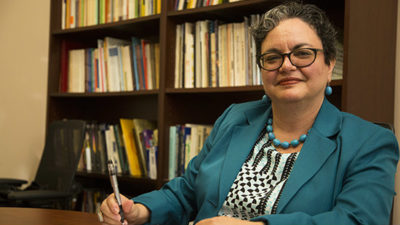Clara Irazábal merges pursuit of social justice and equity in two areas
Clara Irazábal is settling into her new roles as director of the Latina/Latino Studies (LLS) Program and professor of Urban Planning at the University of Missouri-Kansas City, where she combines these roles to pursue social justice and spatial equity.
“These positions allow me to teach, research and serve while addressing the urban challenges our communities face,” said Irazábal.
“I feel mutually connected and devoted to both areas, and my classes at UMKC will have components from urban planning and Latinx Studies, including exploration of issues of economic and community development; affordable and inclusionary housing; and sustainability and resilience for the Latinx communities and other minoritized groups in Kansas City and beyond,” she said. “Not only will we learn to identify and analyze the challenges, but most importantly, rehearse solutions for them while empowering communities.”
Irazábal has conducted her planning research in Latinx communities in the United States and in countries of Latin America, including Venezuela, Brazil, Chile, Argentina, Colombia, Costa Rica, Trinidad and Tobago, and the Caribbean. Throughout her career, she has been motivated by her concern for understanding social justice struggles as displayed in the transformation of urban space, which has allowed her to share her experiences and expertise with communities.
“I have conducted the majority of my urban planning research in the Latinx community. It sets the stage for how to improve practices and the well-being of the entire community, beyond Latinxs,” said Irazábal. “I know here in Kansas City there’s a Troost divide, which the city has not yet overcome. We need to integrate both sides of the community,” she said.
Irazábal explained the rapidly-growing term ‘Latinx’ (pronounced Latin X) as an all-inclusive term. When using ‘Latina or Latino,” some individuals might be excluded. Latinx includes individuals who do not identify as women or men in the LGBTQ community.
The new UMKC Center for Neighborhoods in the Department of Architecture, Urban Planning + Design is an example of where she can merge the two areas of research and engage the community.
“The goal of the center is to promote community development by training leaders, and allowing them to select projects they wish to work on,” Irazábal said. “The Center just graduated its first cohort of trainees, which includes neighborhood leaders and police officers. There is much hope for the LLS and the Center for Neighborhoods as instruments for community development, representing opportunities to learn how to work better, collaborate and create synergies,” she said.
Since her arrival in July, Irazábal has been attending meetings and learning about more initiatives at UMKC, which she will support.
“I have already attended meetings with the UMKC Hispanic Advisory Board and was impressed by how invested its members are in the LLS Program and UMKC at large, as well as their energy when promoting the university and our students,” she said. She has learned about upcoming Division of Diversity and Inclusion programs, including the Social Justice Book and Lecture Series, the Agapito Mendoza Scholarship Breakfast and the Avanzando program.
“Each of these is critical to the success of our students and to celebrate and reach out to the community,” she said.
Irazábal has some specific thoughts about enhancing the LLS Program, which include opportunities for growth.
“I want the program to mature and expand and offer an integrated graduate certificate, a Latina/Latino Studies major and eventually a master’s degree,” she said. “Also, I want the program to include Latina/Latino and Latin Americas Studies, attracting students and faculty to increase visibility and impact in the community,” she said. “I want the program to have a larger presence in our community and for the community to be engaged with us.”
Having arrived at UMKC by way of Columbia University in the City of New York, where she taught and conducted research for eight years, Irazábal worked with the Institute of Latin American Studies and collaborated with the Centers for Brazilian, Mexican and Caribbean Studies.
“Latinxists and Latin Americanists – researchers, teachers and activists – came together to create a synergy, a dialog, an enrichment to communities and students,” she said. “I want to stimulate that here at UMKC.”
While not in the classroom this semester, Irazábal will take the time to be become more familiar with UMKC and the LLS program before teaching in the spring.
“I will teach Introduction to Latina/Latino Studies. It will be a good way to get to know the students and for them to know me,” she said. “Later, I will teach Urban Planning and Latino Studies, which will help students understand community development and the LLS. It will have an impact on the minority community. That course is still being developed,” said Irazábal. She also wants to ensure the students continue to grow their research skills, including investigating, developing and testing hypotheses.
Invoking a line from poet June Jordan – “We are the ones we’ve been waiting for” – and a phrase from activists César Chávez and Dolores Huerta – “Sí se puede (yes we can),” Irazábal illustrated her sense of mission and vision for what she and the community can do together.
|Wandra Brooks Green, Division of Strategic Marketing and Communications

